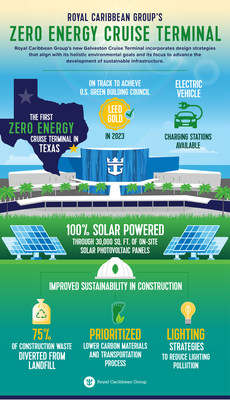ROYAL CARIBBEAN GROUP TO OPEN THE WORLD'S FIRST ZERO-ENERGY CRUISE TERMINAL
The New State-of-the-Art Facility in Texas is on Track to Achieve LEED Gold and be Completely Solar Powered
GALVESTON, Texas, Oct. 13, 2022 /PRNewswire/ -- Royal Caribbean Group's (NYSE: RCL) new Galveston terminal, which is opening Nov. 9, will be the first cruise terminal to generate 100% of its needed energy through on-site solar panels. This makes the terminal, which will be used by the company's Royal Caribbean International brand, the first LEED Zero Energy facility in the world.
"We are focused on innovating across all aspects of our company, especially in our work to advance sustainability in the communities we visit," said Jason Liberty, president and CEO, Royal Caribbean Group. "We deeply value both the oceans we sail and the communities we visit and operate in, and the modern design and development features at our terminal in Galveston will work in service of both."
The new cruise terminal at the Port of Galveston will be the first in Texas to achieve LEED Gold certification, an industry-leading certification expected to be received within the first two quarters of 2023.
In developing the new terminal, Royal Caribbean Group approached design strategies that aligned with its wholistic environmental goals, its focus to advance the development of sustainable infrastructure as well as its decarbonization strategy — Destination Net Zero — including:
- Improved Sustainability in Construction
- The project prioritized using materials that produce less carbon based on energy used and the transportation process.
- During construction, the team has diverted 75% of its waste from landfill.
- Minimized interior sources of pollution through the installation of materials with low or zero volatile organic compounds (VOCs) content, and enhanced air filtration media, focusing on occupant thermal comfort and controllability.
- Renewable Energy and Carbon Reduction
- The terminal will rely on 30,000 square feet of on-site photovoltaic solar panels, enabling the port's self-sufficient energy usage. Any remaining energy not used by the terminal will be sent to the local power grid.
- Carbon emissions are being offset through the purchase of carbon credits.
- Regional and Global Environmental Benefits
- Materials and construction selection contribute to the reduction of "heat island effect" in the Galveston area, a region that experiences higher temperatures than outlying areas due to an over-stimulated energy grid.
- Implement strategies to reduce exterior lighting pollution, which may help minimize negative effects to the night-time sky and the surrounding community.
- Community Connectivity
- By offering bicycle facilities and electric charging stations, the project promotes alternative means of transportation for guests and staff from the surrounding community, reducing transportation-related carbon emissions.
- As the Port of Galveston increases its Electric Vehicles (EV) charging stations, Royal Caribbean International's terminal, T10, will supply infrastructure for the future installation of eight EV charging stations within its parking lot.
The Galveston terminal marks the cruise company's fourth LEED certified facility and its first Gold certified. The previous projects include Terminal A at PortMiami; the Springfield, Oregon campus; and the Innovation Lab at Royal Caribbean Group's corporate headquarters in Miami.
The $125 million, 161,334-square-foot Galveston Cruise Terminal significantly expands the company's presence in the port, increasing the cruise line's ability to accommodate up to 630,000 guests per year. The opening of the terminal will mark the first time Galveston welcomes Royal Caribbean International's signature Oasis Class, the world's largest cruise ships, with the arrival of Allure of the Seas and the first time the company is bringing its frictionless arrival and departure process to Texas.
About Royal Caribbean Group
Royal Caribbean Group (NYSE: RCL) is one of the leading cruise companies in the world with a global fleet of 64 ships traveling to approximately 1,000 destinations around the world. Royal Caribbean Group is the owner and operator of three award-winning cruise brands: Royal Caribbean International, Celebrity Cruises, and Silversea Cruises, and it is also a 50% owner of a joint venture that operates TUI Cruises and Hapag-Lloyd Cruises. Together, the brands have an additional 10 ships on order as of June 30, 2022. Learn more at www.royalcaribbeangroup.com or www.rclinvestor.com.
SOURCE Royal Caribbean Group


